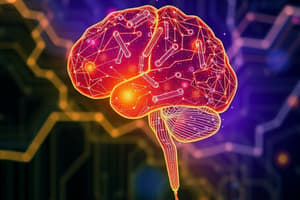Podcast
Questions and Answers
Which of the following sequences accurately reflects the order of memory formation?
Which of the following sequences accurately reflects the order of memory formation?
- Encoding, Storage, Retrieval (correct)
- Retrieval, Storage, Encoding
- Storage, Encoding, Retrieval
- Storage, Retrieval, Encoding
Maintenance rehearsal, which involves repeating information without meaning, is an effective strategy for transferring information into long-term memory.
Maintenance rehearsal, which involves repeating information without meaning, is an effective strategy for transferring information into long-term memory.
False (B)
What type of memory was most significantly impaired in the case of HM (Henry Molaison)?
What type of memory was most significantly impaired in the case of HM (Henry Molaison)?
declarative memory
According to the Multi-Store Model of Memory, memory is first registered in the ___________ before potentially moving to short-term and long-term memory.
According to the Multi-Store Model of Memory, memory is first registered in the ___________ before potentially moving to short-term and long-term memory.
Match the following types of memory with their descriptions:
Match the following types of memory with their descriptions:
In the serial position effect, which of the following is true regarding the primacy effect?
In the serial position effect, which of the following is true regarding the primacy effect?
Experimental designs in memory research are weak because they lack control over confounding variables.
Experimental designs in memory research are weak because they lack control over confounding variables.
What is a key strength of using objective quantitative data when investigating memory?
What is a key strength of using objective quantitative data when investigating memory?
Memory that is consciously recalled is referred to as ___________ memory, while memory that influences our behaviour without conscious awareness is ___________ memory.
Memory that is consciously recalled is referred to as ___________ memory, while memory that influences our behaviour without conscious awareness is ___________ memory.
Which of the following is NOT a method for improving memory?
Which of the following is NOT a method for improving memory?
Shallow processing involves encoding information based on meaning and connections.
Shallow processing involves encoding information based on meaning and connections.
Explain how the theory of displacement accounts for forgetting in STM.
Explain how the theory of displacement accounts for forgetting in STM.
The recency effect, where people recall items from the end of a list, supports the theory of displacement because those items are still active in ___________.
The recency effect, where people recall items from the end of a list, supports the theory of displacement because those items are still active in ___________.
Match the following theories with how they explain forgetting in long-term memory:
Match the following theories with how they explain forgetting in long-term memory:
Which of the following is a common early memory problem in people with Alzheimer's Disease?
Which of the following is a common early memory problem in people with Alzheimer's Disease?
The memory problems in people with Alzheimer's Disease remain constant and do not change over time.
The memory problems in people with Alzheimer's Disease remain constant and do not change over time.
How can biological, psychological, and social factors could influence psychological phenomena?
How can biological, psychological, and social factors could influence psychological phenomena?
In designing an investigation, the __________ is a testable statement about the relationship between two or more variables.
In designing an investigation, the __________ is a testable statement about the relationship between two or more variables.
Focus groups and Delphi Technique are examples of:
Focus groups and Delphi Technique are examples of:
In the Science as a Human Endeavour (SHE) context, 'communication and collaboration' only apply to scientists within the same field.
In the Science as a Human Endeavour (SHE) context, 'communication and collaboration' only apply to scientists within the same field.
Flashcards
Encoding
Encoding
Converting sensory input into a form that can be processed and stored in the brain.
Storage
Storage
Maintaining encoded information over time.
Retrieval
Retrieval
Accessing stored information when needed.
Deep Processing
Deep Processing
Signup and view all the flashcards
Multi-Store Model of Memory
Multi-Store Model of Memory
Signup and view all the flashcards
Sensory Register
Sensory Register
Signup and view all the flashcards
Short-Term Memory (STM)
Short-Term Memory (STM)
Signup and view all the flashcards
Long-Term Memory (LTM)
Long-Term Memory (LTM)
Signup and view all the flashcards
Procedural Memory
Procedural Memory
Signup and view all the flashcards
Episodic Memory
Episodic Memory
Signup and view all the flashcards
Semantic Memory
Semantic Memory
Signup and view all the flashcards
Primacy Effect
Primacy Effect
Signup and view all the flashcards
Recency Effect
Recency Effect
Signup and view all the flashcards
Explicit Memory
Explicit Memory
Signup and view all the flashcards
Implicit Memory
Implicit Memory
Signup and view all the flashcards
Displacement Theory
Displacement Theory
Signup and view all the flashcards
Anterograde Amnesia
Anterograde Amnesia
Signup and view all the flashcards
Alzheimer's Disease
Alzheimer's Disease
Signup and view all the flashcards
Study Notes
- Encoding, storage, and retrieval are critical processes in memory formation.
- Encoding refers to how information is initially learned and processed.
- Storage pertains to maintaining encoded information over time.
- Retrieval involves accessing and bringing stored information back into conscious awareness.
Strategies to Improve Encoding
- Elaborative rehearsal connects new information to existing knowledge.
- Mnemonic devices create associations to aid recall.
- Chunking organizes information into manageable units.
- Spacing effect distributes learning over time to improve retention.
- Self-testing enhances encoding through active recall.
HM and Clive Wearing
- HM (Henry Molaison) and Clive Wearing are famous case studies of individuals with severe amnesia due to brain damage.
- HM had his hippocampus removed, resulting in the inability to form new long-term memories (anterograde amnesia).
- Clive Wearing suffered damage to his hippocampus and frontal lobes, leading to both anterograde and retrograde amnesia (loss of past memories).
- These cases highlight the critical role of specific brain regions in memory formation and recall.
Multi-Store Model of Memory
- The Multi-Store Model proposes three separate memory stores: sensory register, short-term memory (STM), and long-term memory (LTM).
- Sensory register briefly holds sensory information.
- STM has limited capacity and duration.
- LTM has unlimited capacity and can hold information indefinitely.
Types of Memory
- Procedural memory involves skills and habits.
- Episodic memory contains personal experiences and events.
- Semantic memory stores general knowledge and facts.
Serial Position Effect
- The serial position effect is the tendency to remember items at the beginning (primacy effect) and end (recency effect) of a list better than items in the middle.
- The primacy effect is attributed to rehearsal and storage in LTM.
- The recency effect is attributed to items still being in STM.
Experimental Designs
- Strengths of experimental designs include the ability to establish cause-and-effect relationships through manipulation of variables, and high levels of control.
- Weaknesses include artificiality, ethical concerns, and potential for experimenter bias.
Objective and Quantitative Data
- Strengths of using objective and quantitative data include increased reliability, validity, and ease of analysis.
- Weaknesses include oversimplification, lack of context, and potential for misinterpretation.
Explicit and Implicit Memory
- Explicit memory (declarative memory) involves conscious recall of facts and events.
- Implicit memory (nondeclarative memory) involves unconscious influence of past experiences on behavior.
Methods for Improving Memory
- Strategies include elaborative rehearsal, mnemonic devices, chunking, and spaced repetition.
- Lifestyle factors include adequate sleep, exercise, and a healthy diet.
Shallow vs. Deep Processing
- Shallow processing involves encoding information based on surface features.
- Deep processing involves encoding information based on meaning and connections.
- Deep processing leads to better retention.
Displacement Theory
- The theory suggests that new information entering STM pushes out old information due to limited capacity.
- The serial position effect may be used as evidence for the displacement theory of forgetting because the recency effect is dependent on the items still being in short term memory, not having been displaced yet.
Theories of Forgetting
- Interference theory suggests that forgetting occurs due to competition between memories.
- Retrieval failure theory suggests that forgetting occurs due to lack of appropriate retrieval cues.
Alzheimer's Disease
- Memory problems in people with Alzheimer's Disease typically begin with difficulty remembering recent events.
- Over time, memory problems worsen, affecting both short-term and long-term memory.
- Eventually, individuals may experience disorientation, confusion, and loss of recognition.
- Memory difficulties progressively affect all cognitive functions.
Factors of Psychological Phenomena
- Biological factors include genetics, brain structure, and neurochemistry.
- Psychological factors include cognitive processes, emotions, and personality traits.
- Social factors include cultural norms, social support, and environmental stressors.
- These factors can influence the cause, expression, and solutions of psychological phenomena.
Types of Data
- Qualitative data is descriptive and non-numerical.
- Subjective quantitative data is numerical but based on personal opinions.
- Objective quantitative data is numerical and based on objective measurements.
Research Design Types
- Experimental designs involve manipulating variables to determine cause-and-effect relationships.
- Observational designs involve observing and recording behavior in natural or controlled settings.
- Qualitative designs such as focus groups and the Delphi technique involve collecting and analyzing non-numerical data to understand experiences and perspectives.
Science as a Human Endeavour (SHE)
- Communication and Collaboration: Involves sharing research findings and ideas within the scientific community and beyond.
- Development and Application: Focuses on how scientific knowledge is used to develop new technologies, treatments, and solutions to real-world problems.
- Influence: Examines how social, economic, and ethical factors impact scientific research and how scientific discoveries can influence society.
Studying That Suits You
Use AI to generate personalized quizzes and flashcards to suit your learning preferences.




